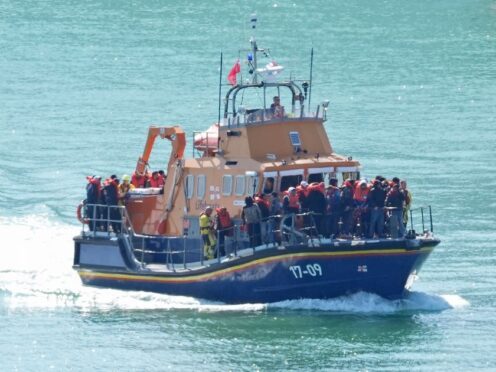The number of migrants arriving in the UK after crossing the Channel has hit a new record for the first six months of a calendar year.
Home Office figures show 257 people made the journey in four boats on Sunday, taking the provisional total for the year so far to 12,901.
The previous record for arrivals in the six months from January to June was 12,747 in 2022. In the first half of 2023, arrivals stood at 11,433.

The 2024 total to date is 17% higher than the number of arrivals recorded this time last year (11,058) and up 8% on the same period in 2022 (11,975).
Last year a total of 29,437 migrants arrived in the UK after crossing the Channel, down 36% on a record 45,774 in 2022.
More than 3,000 arrivals have now been recorded since the General Election was called on May 22 (3,019), with immigration a key campaign battleground.
In the last six and a half years, as the recent migrant crisis unfolded, 127,246 people have arrived in the UK after crossing the Channel, data recorded since the start of 2018 shows.
Some 82,265 people have made the journey since the Government struck the stalled deal to send migrants to Rwanda in April 2022.
The tally of crossings since Rishi Sunak, who pledged to “stop the boats”, became Prime Minister in October that year is nearly 50,000, now standing at 49,964.
Downing Street insisted the Government continues to “bear down” on migrant Channel crossings but migrant charities have called for a “new direction” from the next administration.
A No 10 spokeswoman said: “We continually adapt and step up our efforts to respond to the changing tactics of what are serious criminal gangs facilitating these incredibly dangerous journeys.”
She claimed action taken was already having an impact as she suggested French officers had intercepted more than 8,000 crossings so far this year.
“So we continue to bear down on this issue. But ultimately, as the Prime Minister has also said on many occasions, it’s important that we have the Rwanda plan in place so we can have a deterrent which will fundamentally disrupt the business model of these criminal gangs, and in doing so, stop the boats”, she added.
Steve Valdez-Symonds, Amnesty International UK’s refugee and migrant rights director, said: “Once again, these figures underline a basic truth: that people will keep making these incredibly dangerous journeys for as long as there are no safer alternatives available to them.
“Political rhetoric about ‘stopping the boats’ and ‘smashing the gangs’ is a deliberate distraction, and the majority of people making these crossings are fully entitled to asylum.
“The next UK Government must scrap the current ban on processing people’s claims, abandon the disastrous Rwanda scheme, end the use of unsuitable accommodation like barges and barracks, and instead prioritise an asylum system that decides all claims fairly and efficiently.”
Wanda Wyporska, chief executive at Safe Passage International, said: “We urgently need a new direction from the next Government, one that prioritises opening safe routes for people fleeing war and persecution, fixing refugee family reunion and ending hostile policies.”
